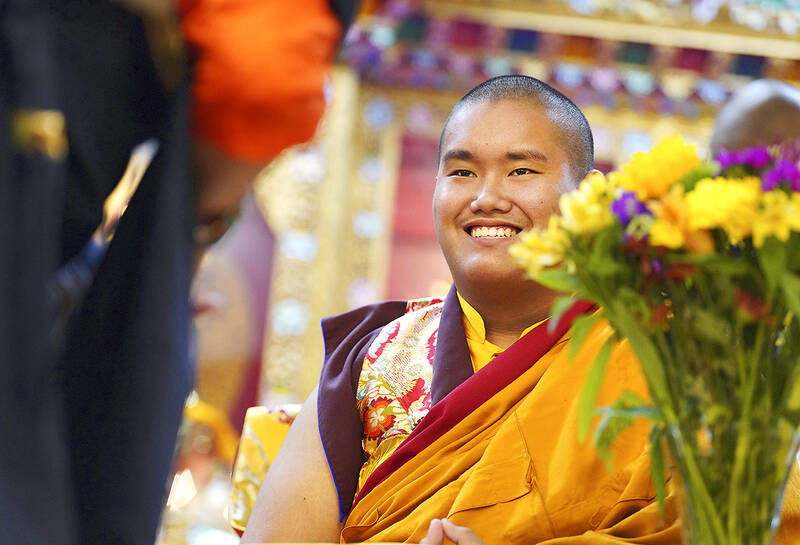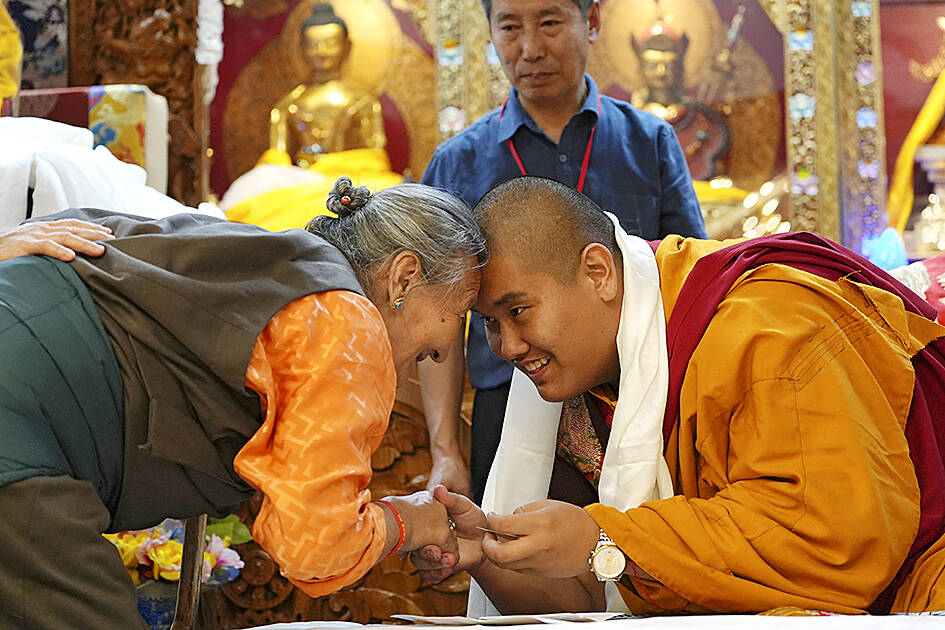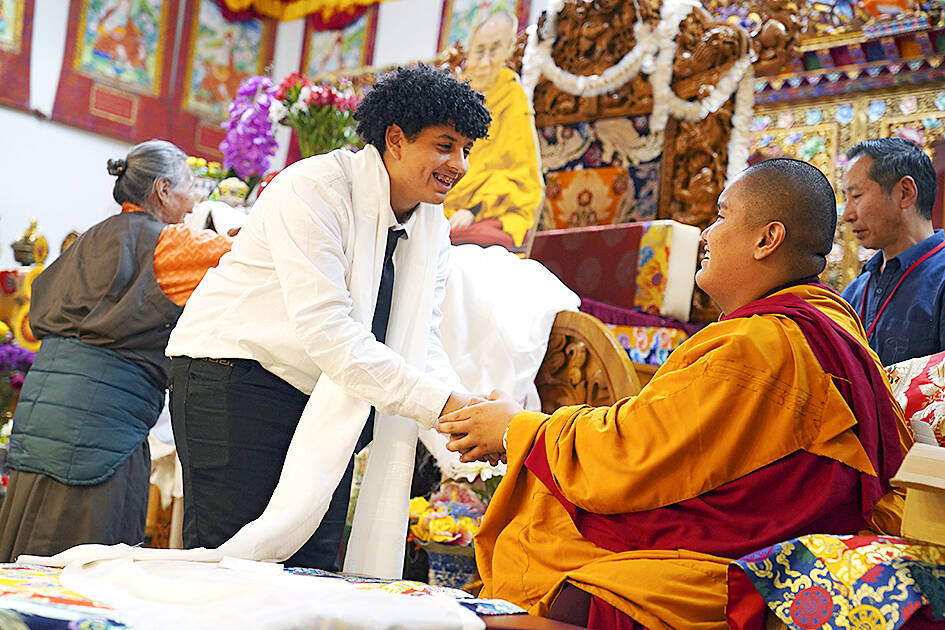The young Buddhist lama sat on a throne near an altar decorated with flowers, fruit and golden statues of the Buddha, watching the celebrations of his 18th birthday in silence, with a faint smile.
Jalue Dorje knew it would be the last big party before he joins a monastery in the Himalayan foothills — thousands of miles from his home in a Minneapolis suburb, where he grew up like a typical American teen playing football and listening to rap music.
But this was not an ordinary coming-of-age celebration. It was an enthronement ceremony for an aspiring spiritual leader who from an early age was recognized by the Dalai Lama and other Tibetan Buddhist leaders as a reincarnated lama.

Photo: AP
From the stage, he saw it all: The young women in white long bearded masks who danced, jumping acrobatically and twirling colorful sticks to wish him luck in a tradition reserved for dignitaries. The banging of drums. The procession of hundreds — from children to elderly — who lined up to bow to him and present him with a khata — the white Tibetan ceremonial scarves that symbolize auspiciousness.
From a throne reserved for lamas, he smelled the aroma of Tibetan dishes prepared by his mother over sleepless nights. He heard the monks with shaved heads, in maroon and gold robes like his own, chant sacred mantras. Behind them, his shaggy-haired high school football teammates sang “Happy Birthday” before he cut the first slice of cake.
One of his buddies gave him shaker bottles for hydrating during training at the gym; another, a gift card to eat at Chipotle Mexican Grill.

Photos: AP
“I was in awe!” Dorje recalled later. “Usually, I’d be at the monk section looking up to whomever was celebrating. But that night it was for me.”
FOOTBALL AND BUDDHIST PRAYERS
Since the Dalai Lama’s recognition, Dorje has spent much of his life training to become a monk, memorizing sacred scriptures, practicing calligraphy and learning the teachings of Buddha.

Photo: AP
After graduation next year, he’ll head to northern India to join the Mindrolling Monastery, more than 11,500 kilometers from his home in Columbia Heights.
Following several years of contemplation and asceticism, he hopes to return to America to teach in the Minnesota Buddhist community. His goal is “to become a leader of peace,” following the example of the Dalai Lama, Nelson Mandela and Gandhi
“There’s going to be a lot of sacrifice involved,” Dorje said.
But he’s not new to sacrifices. He remembered all the early mornings reciting ancient prayers and memorizing Buddhist scriptures, often rewarded by his dad with Pokemon cards.
“As a child, even on the weekend, you’re like: ‘Why don’t I get to sleep more? Why can’t I get up and watch cartoons like other kids.’ But my dad always told me that it’s like planting a seed,” he said, “and one day it’s going to sprout.”
It all began with the process of identifying a lama, which is based on spiritual signs and visions. Dorje was about 4 months old when he was identified by Kyabje Trulshik Rinpoche, a venerated master of Tibetan Buddhism and leader of the Nyingma lineage. He was later confirmed by several lamas as the eighth Terchen Taksham Rinpoche — the first one was born in 1655.
After the Dalai Lama recognized him at age 2, Dorje’s parents took him to meet the spiritual leader of Tibetan Buddhism when he visited Wisconsin in 2010.
The Dalai Lama cut a lock of Dorje’s hair in a ceremony and advised his parents to let their son stay in the US to perfect his English before sending him to a monastery.
Dorje is fluent in English and Tibetan. He grew up reading the manga graphic novel series Buddha and is an avid sports fan. He roots for the Timberwolves in basketball, Real Madrid in soccer and the Atlanta Falcons in football. He even keeps a rookie card of wide receiver Drake Londo pasted to the back of his phone, which he carried wrapped in his robes during his party.
On the football field, playing as a left guard, his teammates praised his positivity, often reminding them to have fun and keep losses in perspective.
“It’s someone to look up to,” said Griffin Hogg, 20, a former player who took Dorje under his wing. He said they learned from each other and credits Dorje with helping him find his spirituality.
“I’m more of a relaxed person after getting to know him and understanding his own journey,” Hogg said.
While Dorje tries to never miss Monday Night Football, he’s always there to help with any event hosted by the local Tibetan community, one of the largest in the US.
“He has one foot in the normal high school life. And he has one foot in this amazing Tibetan culture that we have in the state of Minnesota,” said Kate Thomas, one of his tutors and the teachings coordinator at Minneapolis’ Bodhicitta Sangha Heart of Enlightenment Institute.
“You can see that he’s comfortable playing a role of sitting on a throne, of participating and being honored as a respected person in his community, as a religious figure. And yet, as soon as he has the opportunity, he wants to go and hang out with his high school buddies,” she said. “That’s testimony to his flexibility, his openness of mind.”
RAP AND RELIGION
For years, he has followed the same routine. He wakes up to recite sacred texts and then attends school, followed by football practice. He returns home for tutoring about Tibetan history and Buddhism. Then he might practice calligraphy or run on a treadmill while listening to BossMan Dlow, Rod Wave and other rappers.
Although he was officially enthroned in 2019 in India, an estimated 1,000 people gathered at the Tibetan American Foundation of Minnesota for his recent ceremony.
“He unites us — Jalue is always here for us,” said Zenden Ugen, 21, a family friend and neighbor who performed Tibetan dances at the event.
“I wish him the best in life because being born and not being able to choose your life must be very hard,” Ugen said. “But he has a responsibility and him being able to take on that responsibility, I’m very inspired by him. I just hope he keeps being who he is.”
Dorje’s proud uncle, Tashi Lama, saw him grow up and become a Buddhist master.
“He’s somebody who’s going to be a leader, who’s going to teach compassion and peace and love and harmony among living beings,” he said about his nephew, often referred to as “Rinpoche” — a Tibetan word that means “precious one.”

April 14 to April 20 In March 1947, Sising Katadrepan urged the government to drop the “high mountain people” (高山族) designation for Indigenous Taiwanese and refer to them as “Taiwan people” (台灣族). He considered the term derogatory, arguing that it made them sound like animals. The Taiwan Provincial Government agreed to stop using the term, stating that Indigenous Taiwanese suffered all sorts of discrimination and oppression under the Japanese and were forced to live in the mountains as outsiders to society. Now, under the new regime, they would be seen as equals, thus they should be henceforth

Last week, the the National Immigration Agency (NIA) told the legislature that more than 10,000 naturalized Taiwanese citizens from the People’s Republic of China (PRC) risked having their citizenship revoked if they failed to provide proof that they had renounced their Chinese household registration within the next three months. Renunciation is required under the Act Governing Relations Between the People of the Taiwan Area and the Mainland Area (臺灣地區與大陸地區人民關係條例), as amended in 2004, though it was only a legal requirement after 2000. Prior to that, it had been only an administrative requirement since the Nationality Act (國籍法) was established in

Three big changes have transformed the landscape of Taiwan’s local patronage factions: Increasing Democratic Progressive Party (DPP) involvement, rising new factions and the Chinese Nationalist Party’s (KMT) significantly weakened control. GREEN FACTIONS It is said that “south of the Zhuoshui River (濁水溪), there is no blue-green divide,” meaning that from Yunlin County south there is no difference between KMT and DPP politicians. This is not always true, but there is more than a grain of truth to it. Traditionally, DPP factions are viewed as national entities, with their primary function to secure plum positions in the party and government. This is not unusual

US President Donald Trump’s bid to take back control of the Panama Canal has put his counterpart Jose Raul Mulino in a difficult position and revived fears in the Central American country that US military bases will return. After Trump vowed to reclaim the interoceanic waterway from Chinese influence, US Defense Secretary Pete Hegseth signed an agreement with the Mulino administration last week for the US to deploy troops in areas adjacent to the canal. For more than two decades, after handing over control of the strategically vital waterway to Panama in 1999 and dismantling the bases that protected it, Washington has